Chloethompson
On this page, you find all documents, package deals, and flashcards offered by seller ChloeThompson.
- 82
- 0
- 0
Community
- Followers
- Following
2 Reviews received
82 items
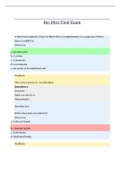
Exam (elaborations) Biochemistry (BIO1802)
Exam (elaborations) Biochemistry (BIO1802) Question text The P site of a ribosome does which of the following? Select one: a. It holds the tRNA that is carrying the next amino acid to be added to the growing polypeptide chain. b. It holds tRNA carrying the growing polypeptide chain. c. It helps "unzip" DNA during transcription. d. It recognizes the promoter during transcription initiation. e. It catalyzes the addition of amino acids to the polypeptide chain of adjacent amino acids. ...
- Exam (elaborations)
- • 141 pages •
Exam (elaborations) Biochemistry (BIO1802) Question text The P site of a ribosome does which of the following? Select one: a. It holds the tRNA that is carrying the next amino acid to be added to the growing polypeptide chain. b. It holds tRNA carrying the growing polypeptide chain. c. It helps "unzip" DNA during transcription. d. It recognizes the promoter during transcription initiation. e. It catalyzes the addition of amino acids to the polypeptide chain of adjacent amino acids. ...
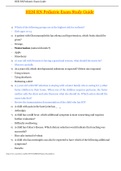
Exam (elaborations) PEDIATRICS - HESI PRACTICE EX (BIO2051)
Exam (elaborations) PEDIATRICS - HESI PRACTICE EX (BIO2051) 1) Which of the following groups are at the highest risk for scoliosis? ∙ Girls ages 10-14 2) A patient with Glorumonephritis has edema and hypertension, which fruits should be given? ∙ Orange, ∙ Watermelon (natural diuretic?) ∙ Apple ∙ Strawberry 3) 16 year old with Seizures is having a grand mal seizure, what should the nurse do? ∙ Observe carefully 4) At 5 years old, which developmental milestone is expected?...
- Exam (elaborations)
- • 5 pages •
Exam (elaborations) PEDIATRICS - HESI PRACTICE EX (BIO2051) 1) Which of the following groups are at the highest risk for scoliosis? ∙ Girls ages 10-14 2) A patient with Glorumonephritis has edema and hypertension, which fruits should be given? ∙ Orange, ∙ Watermelon (natural diuretic?) ∙ Apple ∙ Strawberry 3) 16 year old with Seizures is having a grand mal seizure, what should the nurse do? ∙ Observe carefully 4) At 5 years old, which developmental milestone is expected?...
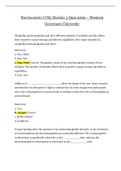
Biochemistry C785 Module 3 Quiz 2020 – Western Governors University
Biochemistry C785 Module 3 Quiz 2020 – Western Governors University Myoglobin and hemoglobin each have different numbers of subunits and this affects their respective oxygen storage and delivery capabilities. How many subunits do myoglobin and hemoglobin each have? Select one: a. Two, Three b. One, Two c. One, Four Correct! Myoglobin consist of one and hemoglobin consists of four subunits. The number of subunits affects their respective oxygen storage and delivery capabilities. d. Fou...
- Exam (elaborations)
- • 14 pages •
Biochemistry C785 Module 3 Quiz 2020 – Western Governors University Myoglobin and hemoglobin each have different numbers of subunits and this affects their respective oxygen storage and delivery capabilities. How many subunits do myoglobin and hemoglobin each have? Select one: a. Two, Three b. One, Two c. One, Four Correct! Myoglobin consist of one and hemoglobin consists of four subunits. The number of subunits affects their respective oxygen storage and delivery capabilities. d. Fou...
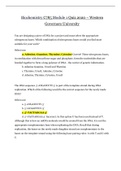
Biochemistry C785 Module 1 Quiz 2020 – Western Governors University
Biochemistry C785 Module 1 Quiz 2020 – Western Governors University You are designing a piece of DNA for a project and must select the appropriate nitrogenous bases. Which combination of nitrogenous bases would you find most suitable for your work? Select one: a. Adenine, Guanine, Thymine, Cytosine Correct! These nitrogenous bases, in combination with deoxyribose sugar and phosphate, form the nucleotides that are bonded together to form a long polymer of DNA - the carrier of genetic inf...
- Exam (elaborations)
- • 9 pages •
Biochemistry C785 Module 1 Quiz 2020 – Western Governors University You are designing a piece of DNA for a project and must select the appropriate nitrogenous bases. Which combination of nitrogenous bases would you find most suitable for your work? Select one: a. Adenine, Guanine, Thymine, Cytosine Correct! These nitrogenous bases, in combination with deoxyribose sugar and phosphate, form the nucleotides that are bonded together to form a long polymer of DNA - the carrier of genetic inf...

Biochemistry C785 Module 2 Quiz 2020 – Western Governors University
Biochemistry C785 Module 2 Quiz 2020 – Western Governors University Which of the following are possible effect(s) that phosphorylation/dephosphorylation can have on the activity of an enzyme? Select one or more: a. Alter the amino acid sequence of the enzyme Incorrect. Phosphorylation is a post-translational modification, meaning that it occurs after the protein is made and the amino acid sequence has been completed. Phosphorylation can alter the conformation of an enzyme, but not the a...
- Exam (elaborations)
- • 5 pages •
Biochemistry C785 Module 2 Quiz 2020 – Western Governors University Which of the following are possible effect(s) that phosphorylation/dephosphorylation can have on the activity of an enzyme? Select one or more: a. Alter the amino acid sequence of the enzyme Incorrect. Phosphorylation is a post-translational modification, meaning that it occurs after the protein is made and the amino acid sequence has been completed. Phosphorylation can alter the conformation of an enzyme, but not the a...

Biochemistry C785 Module 3 Myoglobin and Hemoglobin
Biochemistry C785 Module 3 Myoglobin and Hemoglobin What level of protein structure does hemoglobin have that is not found in myoglobin? 1. primary 2. secondary 3. tertiary 4. quaternary(C0rrect) As carbon monoxide binds to hemoglobin, the protein subunits change conformation to allow carbon monoxide to bind faster. This process is called __________. 1. non-competitive inhibition 2. allosteric binding 3. positive cooperativity(correct) 4. competitive inhibition Even though the ...
- Exam (elaborations)
- • 16 pages •
Biochemistry C785 Module 3 Myoglobin and Hemoglobin What level of protein structure does hemoglobin have that is not found in myoglobin? 1. primary 2. secondary 3. tertiary 4. quaternary(C0rrect) As carbon monoxide binds to hemoglobin, the protein subunits change conformation to allow carbon monoxide to bind faster. This process is called __________. 1. non-competitive inhibition 2. allosteric binding 3. positive cooperativity(correct) 4. competitive inhibition Even though the ...
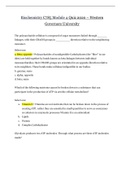
Biochemistry C785 Module 4 Quiz 2020 – Western Governors University
Biochemistry C785 Module 4 Quiz 2020 – Western Governors University Which of the following processes does NOT take place in the mitochondria of a cell? Select one: a. Production of FADH2 b. Conversion of pyruvate to lactic acid ! When oxygen is scarce, pyruvate--created through glycolysis---remains in the cytosol and will be converted anaerobically into lactate (fermentation) c. Creation of a proton gradient d. Production of CO2 in the citric acid cycle Under anaerobic conditions in...
- Exam (elaborations)
- • 9 pages •
Biochemistry C785 Module 4 Quiz 2020 – Western Governors University Which of the following processes does NOT take place in the mitochondria of a cell? Select one: a. Production of FADH2 b. Conversion of pyruvate to lactic acid ! When oxygen is scarce, pyruvate--created through glycolysis---remains in the cytosol and will be converted anaerobically into lactate (fermentation) c. Creation of a proton gradient d. Production of CO2 in the citric acid cycle Under anaerobic conditions in...
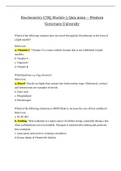
Exam (elaborations) BioChem C785
Exam (elaborations) BioChem C785 Which of the following vitamins does not travel through the bloodstream in the form of a lipid micelle? Select one: a. Vitamin C ! Vitamin C is a water soluble vitamin that is not solubilized in lipid micelles. b. Vitamin A c. Vitamin D d. Vitamin K Which lipid has a 4-ring structure? Select one: a. Sterol ! Sterols are lipids that contain four hydrocarbon rings. Cholesterol, cortisol, and testosterone are examples of sterols. b. Fatty Acid c. Pho...
- Exam (elaborations)
- • 7 pages •
Exam (elaborations) BioChem C785 Which of the following vitamins does not travel through the bloodstream in the form of a lipid micelle? Select one: a. Vitamin C ! Vitamin C is a water soluble vitamin that is not solubilized in lipid micelles. b. Vitamin A c. Vitamin D d. Vitamin K Which lipid has a 4-ring structure? Select one: a. Sterol ! Sterols are lipids that contain four hydrocarbon rings. Cholesterol, cortisol, and testosterone are examples of sterols. b. Fatty Acid c. Pho...
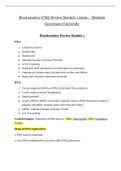
Class notes BioChem C785 (BioChemC785)
Biochemistry C785 Review Module 1 2020 – Western Governors University Fasting: Glucagon- Glut4 in cell membrane moves glucose out of the cells to the body Eating: Insulin- Glut4 on the membrane to move glucose into the cell through facilitated diffusion and active transport. Glucagon- actives when BS is LOW- primary signal for glucagon breakdown Gluconeogenesis- Generate glucose from non-carbohydrate carbon substrates (pyruvates, lactates, glycerol) NADH is oxidized into NAD+ to r...
- Class notes
- • 25 pages •
Biochemistry C785 Review Module 1 2020 – Western Governors University Fasting: Glucagon- Glut4 in cell membrane moves glucose out of the cells to the body Eating: Insulin- Glut4 on the membrane to move glucose into the cell through facilitated diffusion and active transport. Glucagon- actives when BS is LOW- primary signal for glucagon breakdown Gluconeogenesis- Generate glucose from non-carbohydrate carbon substrates (pyruvates, lactates, glycerol) NADH is oxidized into NAD+ to r...
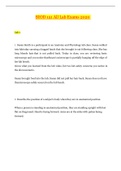
Exam (elaborations) BIOLOGY (BIOD151)
Exam (elaborations) BIOLOGY (BIOD151) 1. Describe the proper way to carry a microscope. You should always carry a microscope by placing one hand under the base while the other hand braces the arm. 2. What portion of the light microscope adjusts the amount of light that passes through the light source? a. The illuminator b. The oculars c. The diaphragm c. The diaphragm LAB 2 1. Give the definition of what a tissue is. A tissue is a grouping of similar cells that wor...
- Exam (elaborations)
- • 66 pages •
Exam (elaborations) BIOLOGY (BIOD151) 1. Describe the proper way to carry a microscope. You should always carry a microscope by placing one hand under the base while the other hand braces the arm. 2. What portion of the light microscope adjusts the amount of light that passes through the light source? a. The illuminator b. The oculars c. The diaphragm c. The diaphragm LAB 2 1. Give the definition of what a tissue is. A tissue is a grouping of similar cells that wor...

PHSC 211 Chapter 4 Quiz (Fall 2020)
TEST BANK FOR POPULATION HEALTH IN COMMUNITY PUBLIC HEALTH NURSING 5TH EDITION STANHOPE CHAPTER 1-32